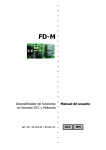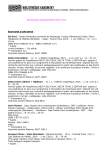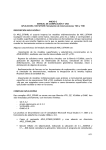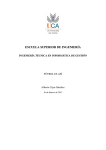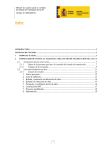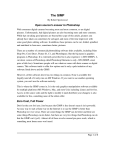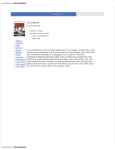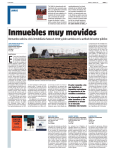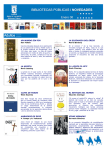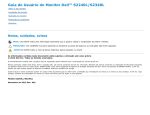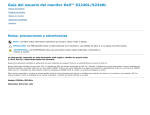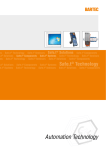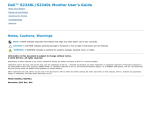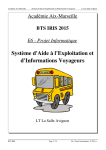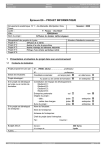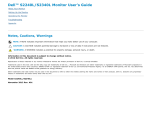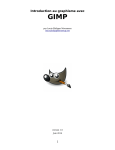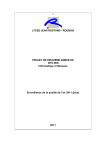Download ESCUELA SUPERIOR DE INGENIERÍA
Transcript
ESCUELA SUPERIOR DE INGENIERÍA INGENIERÍA TÉCNICA EN INFORMÁTICA DE SISTEMAS ZYCARS: JUEGO DE CONDUCCIÓN 2D José Jesús Marente Florín 12 de julio de 2011 ESCUELA SUPERIOR DE INGENIERÍA INGENIERO TÉCNICO EN INFORMÁTICA DE SISTEMAS ZYCARS: JUEGO DE CONDUCCIÓN 2D Departamento: Lenguajes y sistemas informáticos Director del proyecto: Manuel Palomo Duarte Autor del proyecto: José Jesús Marente Florín Cádiz, 12 de julio de 2011 Fdo: José Jesús Marente Florín Agradecimientos Me gustaria dar las gracias a todos esos amigos que he conocido a los largo de la carrera y me han ayudado a lo largo la misma y desarrollo de este proyecto, así como a mi familia, pareja y tutores por el apoyo dado durante todo el desarollo del proyecto. I II Licencia Este documento ha sido liberado bajo Licencia GFDL 1.3 (GNU Free Documentation License). Se incluyen los términos de la licencia en inglés al final del mismo. Copyright (c) 2009 José Jesús Marente FLorín. Permission is granted to copy, distribute and/or modify this document under the terms of the GNU Free Documentation License, Version 1.3 or any later version published by the Free Software Foundation; with no Invariant Sections, no Front-Cover Texts, and no Back-Cover Texts. A copy of the license is included in the section entitled "GNU Free Documentation License". III IV Notación y formato Cuando nos refiramos a un programa o biblioteca en concreto, utilizaremos la notación: Python. Cuando nos refiramos a un fragmento de código, usaremos la notación: Código Cuando nos refiramos a algún comando introducido en la terminal, usaremos la notación: sudo apt-get install V VI Índice general 1. Introducción 1 2. Planificación 3 3. Descripción general del proyecto 5 4. Análisis 7 5. Diseño 9 6. Implementación 11 7. Pruebas y validaciones 13 8. Conclusiones 15 A. Manual de instalación A.1. Linux: Ubuntu. Desde código fuente. . . . . . . . . . . . . . . . . . . . . . . . . . . . . A.2. Linux: Ubuntu. Desde paquete debian. . . . . . . . . . . . . . . . . . . . . . . . . . . . A.3. Windows. . . . . . . . . . . . . . . . . . . . . . . . . . . . . . . . . . . . . . . . . . . 17 17 18 18 B. Manual de usuario B.1. Menú principal . . . . . . . . . B.2. Modos de juego . . . . . . . . . B.2.1. Carrera rápida . . . . . . B.2.2. Campeonato . . . . . . B.2.3. Contrarreloj . . . . . . . B.3. Menú de selección de personaje B.4. Menú de selección de circuito . B.5. Menú de Opciones . . . . . . . B.5.1. Sonido . . . . . . . . . B.5.2. Pantalla . . . . . . . . . B.5.3. Controles . . . . . . . . B.6. Items . . . . . . . . . . . . . . 19 19 19 20 20 20 20 21 21 22 22 23 24 . . . . . . . . . . . . . . . . . . . . . . . . . . . . . . . . . . . . . . . . . . . . . . . . . . . . . . . . . . . . . . . . . . . . . . . . . . . . . . . . . . . . . . . . . . . . . . . . . . . . . . . . . . . . . . . . . . . . . . . . . . . . . . . . . . . . . . . . . . . . . . . . . . . . . . . . . . . . . . . . . . . . . . . . . . . . . . . . . . . . . . . . . . . . . . . . . . . . . . . . . . . . . . . . . . . . . . . . . . . . . . . . . . . . . . . . . . . . . . . . . . . . . . . . . . . . . . . . . . . . . . . . . . . . . . . . . . . . . . . . . . . . . . . . . . . . . . . . . . . . . . . . . . . . . . . . . . . . . . . . . . . . . . . . . . . . . . . . . . . . . . . . . . . . . . . . . . . . . . . . Bibliografia y referencias 26 GNU Free Documentation License 1. APPLICABILITY AND DEFINITIONS . . . . . . . . . . . . . . . . . . . . . . . . . . . 2. VERBATIM COPYING . . . . . . . . . . . . . . . . . . . . . . . . . . . . . . . . . . . . 3. COPYING IN QUANTITY . . . . . . . . . . . . . . . . . . . . . . . . . . . . . . . . . . 29 29 30 30 VII 4. MODIFICATIONS . . . . . . . . . . . . . . . . . . . . . 5. COMBINING DOCUMENTS . . . . . . . . . . . . . . . 6. COLLECTIONS OF DOCUMENTS . . . . . . . . . . . 7. AGGREGATION WITH INDEPENDENT WORKS . . . 8. TRANSLATION . . . . . . . . . . . . . . . . . . . . . . 9. TERMINATION . . . . . . . . . . . . . . . . . . . . . . 10. FUTURE REVISIONS OF THIS LICENSE . . . . . . . 11. RELICENSING . . . . . . . . . . . . . . . . . . . . . . ADDENDUM: How to use this License for your documents VIII . . . . . . . . . . . . . . . . . . . . . . . . . . . . . . . . . . . . . . . . . . . . . . . . . . . . . . . . . . . . . . . . . . . . . . . . . . . . . . . . . . . . . . . . . . . . . . . . . . . . . . . . . . . . . . . . . . . . . . . . . . . . . . . . . . . . . . . . . . . . . . . . . . . . . . . . . . . . . . . . . . 31 32 33 33 33 33 34 34 34 Indice de figuras B.1. Manual de usuario: Menú principal . . . . . . . . B.2. Manual de usuario: Menú selección de personaje B.3. Manual de usuario: Menú selección de circuito . B.4. Manual de usuario: Menú opciones - Audio . . . B.5. Manual de usuario: Menú opciones - Pantalla . . B.6. Manual de usuario: Menú opciones - Controles . B.7. Manual de usuario: Bola de item. . . . . . . . . . B.8. Manual de usuario: Misil. . . . . . . . . . . . . . B.9. Manual de usuario: Tres misiles. . . . . . . . . . B.10. Manual de usuario: Bola. . . . . . . . . . . . . . B.11. Manual de usuario: Chicle. . . . . . . . . . . . . B.12. Manual de usuario: Macha de aceite. . . . . . . . B.13. Manual de usuario: Trubo. . . . . . . . . . . . . IX . . . . . . . . . . . . . . . . . . . . . . . . . . . . . . . . . . . . . . . . . . . . . . . . . . . . . . . . . . . . . . . . . . . . . . . . . . . . . . . . . . . . . . . . . . . . . . . . . . . . . . . . . . . . . . . . . . . . . . . . . . . . . . . . . . . . . . . . . . . . . . . . . . . . . . . . . . . . . . . . . . . . . . . . . . . . . . . . . . . . . . . . . . . . . . . . . . . . . . . . . . . . . . . . . . . . . . . . . . . . . . . . . . . . . . . . . . . . . . . . . . . . . . . . . . . . . . . . . . . . . . . . . . . . . . . . . 19 20 21 22 23 23 24 24 24 25 25 25 25 X Indice de tablas XI XII Capítulo 1 Introducción 1 2 Capítulo 2 Planificación 3 4 Capítulo 3 Descripción general del proyecto 5 6 Capítulo 4 Análisis 7 8 Capítulo 5 Diseño 9 10 Capítulo 6 Implementación 11 12 Capítulo 7 Pruebas y validaciones 13 14 Capítulo 8 Conclusiones 15 16 Apéndice A Manual de instalación A.1. Linux: Ubuntu. Desde código fuente. Para poder ejecutar Zycars desde el código fuente, será necesario la instalación de varias dependencias, para el correcto funcionamiento de la aplicación. La primera de las dependencias a instalar será Pygame, que es la biblioteca principal con la que se ha desarrollado la aplicación. Para instalar, abrimos una terminal y ejecutamos el siguiente comando: sudo apt-get install python-pygame Una vez instalado Pygame, la siguiente dependecia que instalaremos será Subversion para poder obtener la versión más reciente del proyecto del repositorio del mismo. Para instalar subversion ejecutamos la siguiente orden en una terminal: sudo apt-get install subversion Tras instalar Subversion, hacemos checkout del repositorio del proyecto. Para ello ejecutamos en la terminal: svn checkout http://zycars.googlecode.com/svn/trunk/ zycars Con esto hemos obtenido la versión más reciente del código de la aplicación. Ahora accedemos a la carpeta generada anteriormente: cd zycars/ Damos permisos de ejecución al fichero principal. chmod +x run_test.py 17 Tras esto ya podremos jugar sin ningún problema haciendo doble click sobre run_test.py o ejecutando en la terminal: ./run_test.py A.2. Linux: Ubuntu. Desde paquete debian. Para poder realizar la instalación de la aplicación desde el paquete debian, debemos descargarnos el fichero debian para la arquitectura concreta de nuestro Sistema Operativo. Descargamos el fichero desde el siguiente enlace: http://code.google.com/p/zycars/downloads/list Una vez completada la descarga del fichero, hacemos doble click sobre este, y nos indicará si es necesario la instalación de algún paquete. Cuando ya estén instaladas todas las dependencias hacemos click en instalar y esperamos a la finalización de la instalación. Para comenzar a jugar nos vamos a Aplicaciones ->Juegos ->Zycars. A.3. Windows. Para jugar a Zycars en el sistema operativo Windows no es necesario la instalación de ningún programa auxiliar, lo único que necesitaremos descargarnos será versión correspondiente a Windows y descomprimilar. La descargaremos del siguiente enlace: http://code.google.com/p/zycars/downloads/list Tras descomprimir el archivo, accedemos a la carpeta generada llamada "zycars debemos hacer doble click sobre el archivo zycars.exe para comenza a jugar. 2 18 Apéndice B Manual de usuario B.1. Menú principal Desde el menú principal se podrá acceder a los distintos modos de juego disponibles en Zycars, así como las opciones del juegos y la información sobre los desarrolladores del proyecto. Figura B.1: Manual de usuario: Menú principal Debe usar el ratón para seleccionar la opcion que desee. B.2. Modos de juego En Zycars hay disponibles tres modos de juegos, en los que competiremos solos o contra la máquina en función del objetivo que tengamos que lograr. 19 B.2.1. Carrera rápida El modo carrera rápida consiste en competir contra la inteligencia artificial en una única carrera, con el objetivo de mejorar nuestras habilidades y acostumbrarse a los controles del juego. A lo largo del circuito podremos obtener distintos items con los que hacer frente a nuestros competidores. B.2.2. Campeonato En el modo Campeonato competiremos contra la inteligencia artificial a lo largo de cuatro circuitos, en los que obtendremos una puntuación en relación a la posición que hayamos obtenido al concluir la carrera, 4 puntos para el ganador, 2 puntos para el segundo clasificado, 1 punto para el tercero y 0 puntos para el ultimo en concluir la carrera. El competidor que mas puntos haya conseguido al concluir el campeonato, será el ganador del mismo. En este modo también encontraremos items durante las distintas carreras. B.2.3. Contrarreloj En este modo de juego, el modo contrarreloj, el objetivo será batir los distintos records de tiempo que tienen cada uno de los circuitos, podremos mejorar tanto el tiempo general de la carrera, como el tiempo obtenido en la vuelta mas rápida. Tendremos un máximo de 3 vueltas para mejorar los tiempos. En este modo de juego no encontraremos items, ya que no tendremos ningún oponente al que tengamos que batir. B.3. Menú de selección de personaje Una vez seleccionado un modo de juego, pasaremos al menú de seleccion de personaje. En este menú se nos mostrarán todos los personajes disponibles en Zycars, asi como el coche que cada uno de ellos conduce y las distintas características que poseen los coches. Figura B.2: Manual de usuario: Menú selección de personaje 20 Con el ratón podremos navegar sobre los distintos personajes pulsando sobre las flechas rojas. Pulsaremos en el botón aceptar, para elegir el personaje seleccionado. Si queremos volver al menún principal, pulsaremos sobre el botón cancelar. B.4. Menú de selección de circuito Una vez seleccionado el personaje con el que deseamos competir, pasaremos al menú de selección de circuito. En este menú se nos muestran los distintos campeonatos que posee el juego, así como los circuitos que componen cada uno de los campeonatos. Figura B.3: Manual de usuario: Menú selección de circuito Si nos encontramos en el modo carrera rápida o en el modo contrarreloj, deberemos seleccionar algún circuito de todos los disponibles, una vez elejido, pulsaremos aceptar, en el caso de que queramos volver al menú de selección de personaje pulsaremos sobre el botón cancelar. Si estamos en el modo campeonato, podremos ver todos los circuitos que componen cada uno de los campeonato, al pulsar sobre el botón aceptar, indicaremos que seleccionamos el campeonato actual. Si pulsamos el botón cancelar volveremos al menú de selección de personaje. Podremos elegir, en la parte derecha del menú, el número de vueltas que queremos que realicen en cada una de las carreras. Esta opción no estará disponible en el modo campeonato, ya que en este modo siempre habra que dar 3 vueltas al circuito. B.5. Menú de Opciones En el menú de opciones, podremos modificar distintos apartados como sonido, características de pantalla y controles del juego. Una vez realizados los cambios y deseamos que se apliquen debemos pulsar 21 el botón aceptar, si por el contrario deseamos volver al menú principal si que se aplique ninguno de los cambios realizados, debemos pulsar sobre el botón cancelar. B.5.1. Sonido En este menú podremos seleccionar y modificar tanto el volumen de los efectos de sonido que se encuentran en el juego, así como el volumen de la música que escuchamos a lo largo de las distintas pantallas y circuitos. Figura B.4: Manual de usuario: Menú opciones - Audio Como podemos ver, hay dos slider para la regulación del sonido y la música. También hay un checkbox, que nos permitirá silenciar todo, tanto los efectos de sonido como la música. B.5.2. Pantalla En este apartado solo dispondremos de una única opción. Esta opción nos permitira indicar si deseamos el juego a pantalla completa o si por el contrario lo deseamos al tamaño original de 800x600 píxeless. 22 Figura B.5: Manual de usuario: Menú opciones - Pantalla B.5.3. Controles En esta sección del Menú de opciones podemos modificar que controles deseamos a la hora de manejar el vehículo. Los controles que podemos modificar son los de dirección, lanzamiento de los items y pausar el juego. Figura B.6: Manual de usuario: Menú opciones - Controles Debemos pulsar sobre las flechas para modificar los controles que queremos usar. 23 B.6. Items Durante las carreras en las que compitamos contra la máquina, a lo largo de los circuitos encontraremos unas bolas que nos proporionarán distintos elementos con los que podremos atacar a nuestros oponentes, dejar obstáculos o aumenten nuestra velocidad durante un periodo de tiempo. Figura B.7: Manual de usuario: Bola de item. Los distintos item que podemos conseguir tras atravesar la bola de item se describen a continuación: Misil: este item proporciona un único misil al jugador, el cual podremos lanzar a nuestros competidores, en caso de que el misil colisione con algún jugador, este perdera el control durante unos instantes. En el caso de que el misil colisione con algún objeto colisionable explotará. Figura B.8: Manual de usuario: Misil. Misil x 3: este item nos proporciona 3 misiles que tienen las mismas características que el misil normal, introducido anteriormente. Figura B.9: Manual de usuario: Tres misiles. Bola: este item tiene las mismas características que un misil, la única diferencia existente es que al colisionar con algun objete no explotará, si no que rebotará. Sólo explotará en el caso de que colisione con algún jugador. 24 Figura B.10: Manual de usuario: Bola. Chicle: este item nos proporciona un chicle que al lanzarlo en el circuito, se pegará al asfalto de forma permanente. Cualquier jugador que pase por encima de él, decrementará su velocidad. Figura B.11: Manual de usuario: Chicle. Mancha de aceite: este item nos proporciona una mancha de aceite que al lanzarla quedará en el circuito y cualquier jugador que pase por encima, perdera el control del vehículo durante unos instantes. Figura B.12: Manual de usuario: Macha de aceite. Turbo: este item nos permitirá doblar nuestra velocidad durante unos instantes. Figura B.13: Manual de usuario: Trubo. 25 26 Bibliografía [1] Página oficial sobre el lenguaje de programación Python. http://www.python.org/. [2] Pilgrim, Mark. Dive into Python. Apress, 2004. 413p. ISBN:978-1590593561. [3] Larman, Craig. Applying UML and Patterns, 3a Edición. Prentice Hall, 2004. 736p. ISBN:9780131489066. [4] Página oficial de la herramienta para documentar código Doxygen. http://www.stack.nl/~dimitri/doxygen/ [5] Lambert M. Surhone; Mariam T. Tenroe Y Susan F. Henssonow (Ed). Doxygen. Betascript Publishing, 2010. 168p. ISBN:978-3639910025. [6] Guía para la generación de la memoria del Proyecto Fin de Carrera. http://osl2.uca.es/wikiformacion/index.php/LaTeX_para_Proyecto_ Fin_de_Carrera. [7] Página oficial sobre la herramienta BOUML. http://bouml.free.fr/index.html [8] Foguel, Karl. Producing Open Source Software, 1a edición. O’Reilly Media, 2005. 304p. ISBN:978-0596007591. [9] Página oficial de la herramienta de edición de imágenes GIMP. http://www.gimp.org/ [10] Peck, Akkana. Beginning GIMP : from novice to professional, 2a edición. Apress, 2008. 584p. ISBN:978-1-4302-1070-2 27 28 GNU Free Documentation License Version 1.3, 3 November 2008 c 2000, 2001, 2002, 2007, 2008 Free Software Foundation, Inc. Copyright <http://fsf.org/> Everyone is permitted to copy and distribute verbatim copies of this license document, but changing it is not allowed. Preamble The purpose of this License is to make a manual, textbook, or other functional and useful document “free” in the sense of freedom: to assure everyone the effective freedom to copy and redistribute it, with or without modifying it, either commercially or noncommercially. Secondarily, this License preserves for the author and publisher a way to get credit for their work, while not being considered responsible for modifications made by others. This License is a kind of “copyleft”, which means that derivative works of the document must themselves be free in the same sense. It complements the GNU General Public License, which is a copyleft license designed for free software. We have designed this License in order to use it for manuals for free software, because free software needs free documentation: a free program should come with manuals providing the same freedoms that the software does. But this License is not limited to software manuals; it can be used for any textual work, regardless of subject matter or whether it is published as a printed book. We recommend this License principally for works whose purpose is instruction or reference. 1. APPLICABILITY AND DEFINITIONS This License applies to any manual or other work, in any medium, that contains a notice placed by the copyright holder saying it can be distributed under the terms of this License. Such a notice grants a world-wide, royalty-free license, unlimited in duration, to use that work under the conditions stated herein. The “Document”, below, refers to any such manual or work. Any member of the public is a licensee, and is addressed as “you”. You accept the license if you copy, modify or distribute the work in a way requiring permission under copyright law. A “Modified Version” of the Document means any work containing the Document or a portion of it, either copied verbatim, or with modifications and/or translated into another language. A “Secondary Section” is a named appendix or a front-matter section of the Document that deals exclusively with the relationship of the publishers or authors of the Document to the Document’s overall subject (or to related matters) and contains nothing that could fall directly within that overall subject. (Thus, if the Document is in part a textbook of mathematics, a Secondary Section may not explain any mathematics.) The relationship could be a matter of historical connection with the subject or with related matters, or of legal, commercial, philosophical, ethical or political position regarding them. 29 The “Invariant Sections” are certain Secondary Sections whose titles are designated, as being those of Invariant Sections, in the notice that says that the Document is released under this License. If a section does not fit the above definition of Secondary then it is not allowed to be designated as Invariant. The Document may contain zero Invariant Sections. If the Document does not identify any Invariant Sections then there are none. The “Cover Texts” are certain short passages of text that are listed, as Front-Cover Texts or Back-Cover Texts, in the notice that says that the Document is released under this License. A Front-Cover Text may be at most 5 words, and a Back-Cover Text may be at most 25 words. A “Transparent” copy of the Document means a machine-readable copy, represented in a format whose specification is available to the general public, that is suitable for revising the document straightforwardly with generic text editors or (for images composed of pixels) generic paint programs or (for drawings) some widely available drawing editor, and that is suitable for input to text formatters or for automatic translation to a variety of formats suitable for input to text formatters. A copy made in an otherwise Transparent file format whose markup, or absence of markup, has been arranged to thwart or discourage subsequent modification by readers is not Transparent. An image format is not Transparent if used for any substantial amount of text. A copy that is not “Transparent” is called “Opaque”. Examples of suitable formats for Transparent copies include plain ASCII without markup, Texinfo input format, LaTeX input format, SGML or XML using a publicly available DTD, and standard-conforming simple HTML, PostScript or PDF designed for human modification. Examples of transparent image formats include PNG, XCF and JPG. Opaque formats include proprietary formats that can be read and edited only by proprietary word processors, SGML or XML for which the DTD and/or processing tools are not generally available, and the machine-generated HTML, PostScript or PDF produced by some word processors for output purposes only. The “Title Page” means, for a printed book, the title page itself, plus such following pages as are needed to hold, legibly, the material this License requires to appear in the title page. For works in formats which do not have any title page as such, “Title Page” means the text near the most prominent appearance of the work’s title, preceding the beginning of the body of the text. The “publisher” means any person or entity that distributes copies of the Document to the public. A section “Entitled XYZ” means a named subunit of the Document whose title either is precisely XYZ or contains XYZ in parentheses following text that translates XYZ in another language. (Here XYZ stands for a specific section name mentioned below, such as “Acknowledgements”, “Dedications”, “Endorsements”, or “History”.) To “Preserve the Title” of such a section when you modify the Document means that it remains a section “Entitled XYZ” according to this definition. The Document may include Warranty Disclaimers next to the notice which states that this License applies to the Document. These Warranty Disclaimers are considered to be included by reference in this License, but only as regards disclaiming warranties: any other implication that these Warranty Disclaimers may have is void and has no effect on the meaning of this License. 2. VERBATIM COPYING You may copy and distribute the Document in any medium, either commercially or noncommercially, provided that this License, the copyright notices, and the license notice saying this License applies to the Document are reproduced in all copies, and that you add no other conditions whatsoever to those of this License. You may not use technical measures to obstruct or control the reading or further copying of the copies you make or distribute. However, you may accept compensation in exchange for copies. If you distribute a large enough number of copies you must also follow the conditions in section 3. You may also lend copies, under the same conditions stated above, and you may publicly display copies. 3. COPYING IN QUANTITY 30 If you publish printed copies (or copies in media that commonly have printed covers) of the Document, numbering more than 100, and the Document’s license notice requires Cover Texts, you must enclose the copies in covers that carry, clearly and legibly, all these Cover Texts: Front-Cover Texts on the front cover, and Back-Cover Texts on the back cover. Both covers must also clearly and legibly identify you as the publisher of these copies. The front cover must present the full title with all words of the title equally prominent and visible. You may add other material on the covers in addition. Copying with changes limited to the covers, as long as they preserve the title of the Document and satisfy these conditions, can be treated as verbatim copying in other respects. If the required texts for either cover are too voluminous to fit legibly, you should put the first ones listed (as many as fit reasonably) on the actual cover, and continue the rest onto adjacent pages. If you publish or distribute Opaque copies of the Document numbering more than 100, you must either include a machine-readable Transparent copy along with each Opaque copy, or state in or with each Opaque copy a computer-network location from which the general network-using public has access to download using public-standard network protocols a complete Transparent copy of the Document, free of added material. If you use the latter option, you must take reasonably prudent steps, when you begin distribution of Opaque copies in quantity, to ensure that this Transparent copy will remain thus accessible at the stated location until at least one year after the last time you distribute an Opaque copy (directly or through your agents or retailers) of that edition to the public. It is requested, but not required, that you contact the authors of the Document well before redistributing any large number of copies, to give them a chance to provide you with an updated version of the Document. 4. MODIFICATIONS You may copy and distribute a Modified Version of the Document under the conditions of sections 2 and 3 above, provided that you release the Modified Version under precisely this License, with the Modified Version filling the role of the Document, thus licensing distribution and modification of the Modified Version to whoever possesses a copy of it. In addition, you must do these things in the Modified Version: A. Use in the Title Page (and on the covers, if any) a title distinct from that of the Document, and from those of previous versions (which should, if there were any, be listed in the History section of the Document). You may use the same title as a previous version if the original publisher of that version gives permission. B. List on the Title Page, as authors, one or more persons or entities responsible for authorship of the modifications in the Modified Version, together with at least five of the principal authors of the Document (all of its principal authors, if it has fewer than five), unless they release you from this requirement. C. State on the Title page the name of the publisher of the Modified Version, as the publisher. D. Preserve all the copyright notices of the Document. E. Add an appropriate copyright notice for your modifications adjacent to the other copyright notices. F. Include, immediately after the copyright notices, a license notice giving the public permission to use the Modified Version under the terms of this License, in the form shown in the Addendum below. G. Preserve in that license notice the full lists of Invariant Sections and required Cover Texts given in the Document’s license notice. 31 H. Include an unaltered copy of this License. I. Preserve the section Entitled “History”, Preserve its Title, and add to it an item stating at least the title, year, new authors, and publisher of the Modified Version as given on the Title Page. If there is no section Entitled “History” in the Document, create one stating the title, year, authors, and publisher of the Document as given on its Title Page, then add an item describing the Modified Version as stated in the previous sentence. J. Preserve the network location, if any, given in the Document for public access to a Transparent copy of the Document, and likewise the network locations given in the Document for previous versions it was based on. These may be placed in the “History” section. You may omit a network location for a work that was published at least four years before the Document itself, or if the original publisher of the version it refers to gives permission. K. For any section Entitled “Acknowledgements” or “Dedications”, Preserve the Title of the section, and preserve in the section all the substance and tone of each of the contributor acknowledgements and/or dedications given therein. L. Preserve all the Invariant Sections of the Document, unaltered in their text and in their titles. Section numbers or the equivalent are not considered part of the section titles. M. Delete any section Entitled “Endorsements”. Such a section may not be included in the Modified Version. N. Do not retitle any existing section to be Entitled “Endorsements” or to conflict in title with any Invariant Section. O. Preserve any Warranty Disclaimers. If the Modified Version includes new front-matter sections or appendices that qualify as Secondary Sections and contain no material copied from the Document, you may at your option designate some or all of these sections as invariant. To do this, add their titles to the list of Invariant Sections in the Modified Version’s license notice. These titles must be distinct from any other section titles. You may add a section Entitled “Endorsements”, provided it contains nothing but endorsements of your Modified Version by various parties—for example, statements of peer review or that the text has been approved by an organization as the authoritative definition of a standard. You may add a passage of up to five words as a Front-Cover Text, and a passage of up to 25 words as a Back-Cover Text, to the end of the list of Cover Texts in the Modified Version. Only one passage of Front-Cover Text and one of Back-Cover Text may be added by (or through arrangements made by) any one entity. If the Document already includes a cover text for the same cover, previously added by you or by arrangement made by the same entity you are acting on behalf of, you may not add another; but you may replace the old one, on explicit permission from the previous publisher that added the old one. The author(s) and publisher(s) of the Document do not by this License give permission to use their names for publicity for or to assert or imply endorsement of any Modified Version. 5. COMBINING DOCUMENTS You may combine the Document with other documents released under this License, under the terms defined in section 4 above for modified versions, provided that you include in the combination all of the Invariant Sections of all of the original documents, unmodified, and list them all as Invariant Sections of your combined work in its license notice, and that you preserve all their Warranty Disclaimers. 32 The combined work need only contain one copy of this License, and multiple identical Invariant Sections may be replaced with a single copy. If there are multiple Invariant Sections with the same name but different contents, make the title of each such section unique by adding at the end of it, in parentheses, the name of the original author or publisher of that section if known, or else a unique number. Make the same adjustment to the section titles in the list of Invariant Sections in the license notice of the combined work. In the combination, you must combine any sections Entitled “History” in the various original documents, forming one section Entitled “History”; likewise combine any sections Entitled “Acknowledgements”, and any sections Entitled “Dedications”. You must delete all sections Entitled “Endorsements”. 6. COLLECTIONS OF DOCUMENTS You may make a collection consisting of the Document and other documents released under this License, and replace the individual copies of this License in the various documents with a single copy that is included in the collection, provided that you follow the rules of this License for verbatim copying of each of the documents in all other respects. You may extract a single document from such a collection, and distribute it individually under this License, provided you insert a copy of this License into the extracted document, and follow this License in all other respects regarding verbatim copying of that document. 7. AGGREGATION WITH INDEPENDENT WORKS A compilation of the Document or its derivatives with other separate and independent documents or works, in or on a volume of a storage or distribution medium, is called an “aggregate” if the copyright resulting from the compilation is not used to limit the legal rights of the compilation’s users beyond what the individual works permit. When the Document is included in an aggregate, this License does not apply to the other works in the aggregate which are not themselves derivative works of the Document. If the Cover Text requirement of section 3 is applicable to these copies of the Document, then if the Document is less than one half of the entire aggregate, the Document’s Cover Texts may be placed on covers that bracket the Document within the aggregate, or the electronic equivalent of covers if the Document is in electronic form. Otherwise they must appear on printed covers that bracket the whole aggregate. 8. TRANSLATION Translation is considered a kind of modification, so you may distribute translations of the Document under the terms of section 4. Replacing Invariant Sections with translations requires special permission from their copyright holders, but you may include translations of some or all Invariant Sections in addition to the original versions of these Invariant Sections. You may include a translation of this License, and all the license notices in the Document, and any Warranty Disclaimers, provided that you also include the original English version of this License and the original versions of those notices and disclaimers. In case of a disagreement between the translation and the original version of this License or a notice or disclaimer, the original version will prevail. If a section in the Document is Entitled “Acknowledgements”, “Dedications”, or “History”, the requirement (section 4) to Preserve its Title (section 1) will typically require changing the actual title. 9. TERMINATION 33 You may not copy, modify, sublicense, or distribute the Document except as expressly provided under this License. Any attempt otherwise to copy, modify, sublicense, or distribute it is void, and will automatically terminate your rights under this License. However, if you cease all violation of this License, then your license from a particular copyright holder is reinstated (a) provisionally, unless and until the copyright holder explicitly and finally terminates your license, and (b) permanently, if the copyright holder fails to notify you of the violation by some reasonable means prior to 60 days after the cessation. Moreover, your license from a particular copyright holder is reinstated permanently if the copyright holder notifies you of the violation by some reasonable means, this is the first time you have received notice of violation of this License (for any work) from that copyright holder, and you cure the violation prior to 30 days after your receipt of the notice. Termination of your rights under this section does not terminate the licenses of parties who have received copies or rights from you under this License. If your rights have been terminated and not permanently reinstated, receipt of a copy of some or all of the same material does not give you any rights to use it. 10. FUTURE REVISIONS OF THIS LICENSE The Free Software Foundation may publish new, revised versions of the GNU Free Documentation License from time to time. Such new versions will be similar in spirit to the present version, but may differ in detail to address new problems or concerns. See http://www.gnu.org/copyleft/. Each version of the License is given a distinguishing version number. If the Document specifies that a particular numbered version of this License “or any later version” applies to it, you have the option of following the terms and conditions either of that specified version or of any later version that has been published (not as a draft) by the Free Software Foundation. If the Document does not specify a version number of this License, you may choose any version ever published (not as a draft) by the Free Software Foundation. If the Document specifies that a proxy can decide which future versions of this License can be used, that proxy’s public statement of acceptance of a version permanently authorizes you to choose that version for the Document. 11. RELICENSING “Massive Multiauthor Collaboration Site” (or “MMC Site”) means any World Wide Web server that publishes copyrightable works and also provides prominent facilities for anybody to edit those works. A public wiki that anybody can edit is an example of such a server. A “Massive Multiauthor Collaboration” (or “MMC”) contained in the site means any set of copyrightable works thus published on the MMC site. “CC-BY-SA” means the Creative Commons Attribution-Share Alike 3.0 license published by Creative Commons Corporation, a not-for-profit corporation with a principal place of business in San Francisco, California, as well as future copyleft versions of that license published by that same organization. “Incorporate” means to publish or republish a Document, in whole or in part, as part of another Document. An MMC is “eligible for relicensing” if it is licensed under this License, and if all works that were first published under this License somewhere other than this MMC, and subsequently incorporated in whole or in part into the MMC, (1) had no cover texts or invariant sections, and (2) were thus incorporated prior to November 1, 2008. The operator of an MMC Site may republish an MMC contained in the site under CC-BY-SA on the same site at any time before August 1, 2009, provided the MMC is eligible for relicensing. ADDENDUM: How to use this License for your documents 34 To use this License in a document you have written, include a copy of the License in the document and put the following copyright and license notices just after the title page: c YEAR YOUR NAME. Permission is granted to copy, distribute and/or modify Copyright this document under the terms of the GNU Free Documentation License, Version 1.3 or any later version published by the Free Software Foundation; with no Invariant Sections, no Front-Cover Texts, and no Back-Cover Texts. A copy of the license is included in the section entitled “GNU Free Documentation License”. If you have Invariant Sections, Front-Cover Texts and Back-Cover Texts, replace the “with . . . Texts.” line with this: with the Invariant Sections being LIST THEIR TITLES, with the Front-Cover Texts being LIST, and with the Back-Cover Texts being LIST. If you have Invariant Sections without Cover Texts, or some other combination of the three, merge those two alternatives to suit the situation. If your document contains nontrivial examples of program code, we recommend releasing these examples in parallel under your choice of free software license, such as the GNU General Public License, to permit their use in free software. 35




















































